As engines age, they inherently become more attention-demanding as their parts wear. Some engines, though, are simply considered unreliable due to common failures even during their lower-mileage life. That doesn’t mean they are worth writing off, however. The BMW N54 and Audi 2.7T are both regularly called ‘unreliable’ but their performance potential outweighs any fears someone should have about them. This week, we’re looking at both the N54 and 2.7T common problems, how to address them, and why you should rethink what you’d call ‘unreliable.’
Like anything nice, the better you take care of it, the better it will take care of you. The N54 and 2.7T are no different, if you perform all the work they require to be reliable and then maintain them regularly, you’ll have exceptional engines with little risk of engine trouble down the road.
First, let’s address the common failures N54 owners may experience, what causes them, and how you can prevent them with your N54 or prospective N54-powered project.

Water Pump / Cooling System
One of the more common concerns N54 owners, and all modern BMW owners for that matter, should have is water pump failure. Since the water pump is electrically driven on these and other modern BMW engines, there is nothing physically driving the pump outside of an internal electric motor. If and when that motor fails, it can happen suddenly and without warning. There isn’t a belt to inspect or pulley you can physically see and hear give off the telltale signs of age, so a failing water pump can be easily missed in a visual and sensory inspection of the car. In some cases, seeping coolant or outright leaks will give away a bad water pump, but that isn’t always the case. Just because yours isn’t leaking does not mean it isn’t about to die. Regular cooling service maintenance is key to prevent water pump failure and limp mode in your N54-powered BMW. A cooling service should include fresh Genuine BMW coolant, a new water pump, thermostat, and potentially upper and lower radiator hoses depending on their condition.
Speaking of those hoses, the heat cycling they experience deteriorates the plastic, particularly on the little nipples that sprout from the main hard connections from the rubber hoses on each end. Even the slightest hit can snap these brittle plastic components after years and miles of road use. Regularly replace these hoses with your cooling service or upgrade to silicone hoses for extended lifespans and higher strength to combat heat generated from upgraded engines.
Assembled by ECS N54 Ultimate Water Pump & Thermostat Kit
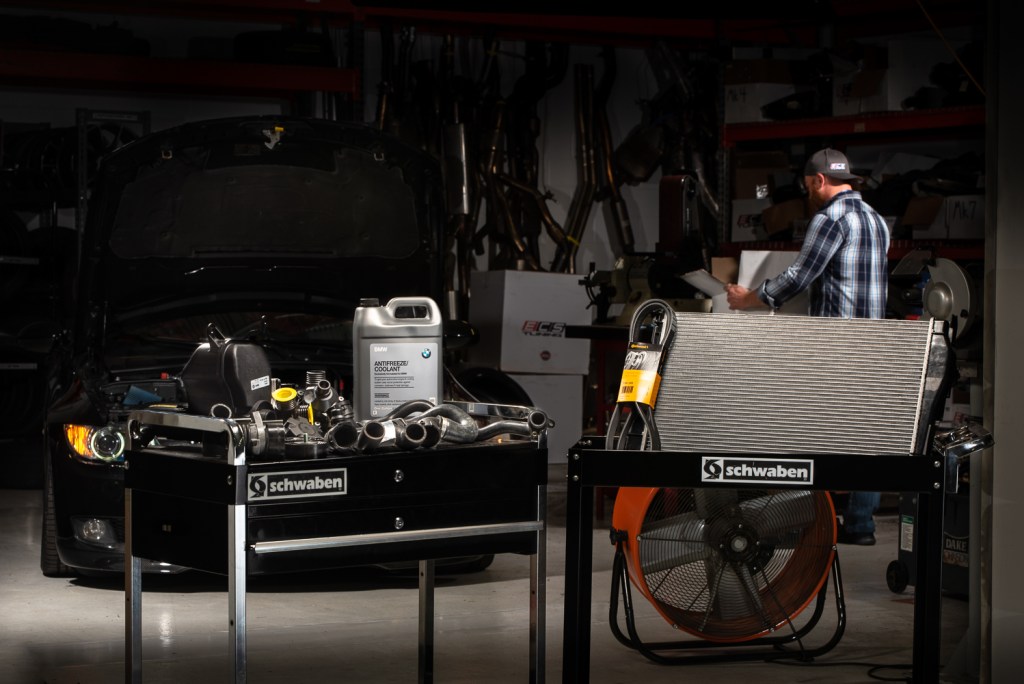
Turbos / Wastegates
When the N54 was fairly new, owners began experiencing turbo failure and ‘wastegate rattle’ that could ultimately lead to turbo failure as well. It took BMW quite a while to effectively understand what was happening, and by the time they did, they’d already phased out the twin turbo design with the new twin-scroll N55 variant, forever leaving the N54 behind. We now know this failure is generally associated with carbon buildup from neglecting to perform the regular walnut shell blasting needed to wash out carbon that isn’t internally cleaned off by fuel passing over the valves due to the direct-injection fuel system BMW used with the N54. There were some mechanical issues with the turbos as well, but failure was most common with engines that neglected their carbon cleaning maintenance. Now, there are two things N54 owners should do to prevent issues down the road.
First, unless your turbos are documented as new or recently replaced, it’s a good idea to at least replace your turbos with our Assembled by ECS Turbo Replacement Kit. This is everything you need to start with a fresh slate and ensure your engine produces all the power it should from it’s stock turbos. This is also a good time to consider turbo upgrades, like Pure Turbos or Vargas Turbos, to add more power and better reliability.
While you’re performing the turbo replacement, you should both tackle the walnut blasting to clean the intake valves and ports of any carbon buildup. This will prevent your your engine from breathing any of that carbon. Of course, to reduce carbon buildup permanently, we also suggest a baffled oil catch can. This simple upgrade intercepts the dirty air from the crankcase that is expelled from the PCV system before it re-enters the intake. By trapping those suspended particles, your engine won’t send any of them through the intake ports, thus preventing much of the buildup common to direct injection engines.
Assembled by ECS N54 Twin Turbo Replacement Kit
Assembled by ECS N54 Twin Turbo VTT Stock Upgrade Kit

Oil Service / Oil Filter Housing Gasket
Another plague to N54s is their inherent need to leak oil, particularly from the oil filter housing. Naturally, we have a kit for that to replace your oil filter housing gasket and tackle your BMW oil service all at once. This is by no means the only place you’ll experience an oil leak, but it’s one of the most annoying and commonly documented leaks. Other common leakers are the valve cover gasket, rear main seal, and oil pan gasket. Be sure to check these for any seepage and replace as-needed. With regular oil service and no leaks, your N54 will be perfectly capable of lubricating itself properly and prevent any catastrophic failure.
Assembled by ECS N54 Oil Service Kits
Assembled by ECS N54 Oil Filter Housing Gasket Kit
Assembled by ECS N54 Oil Pan Gasket Kit
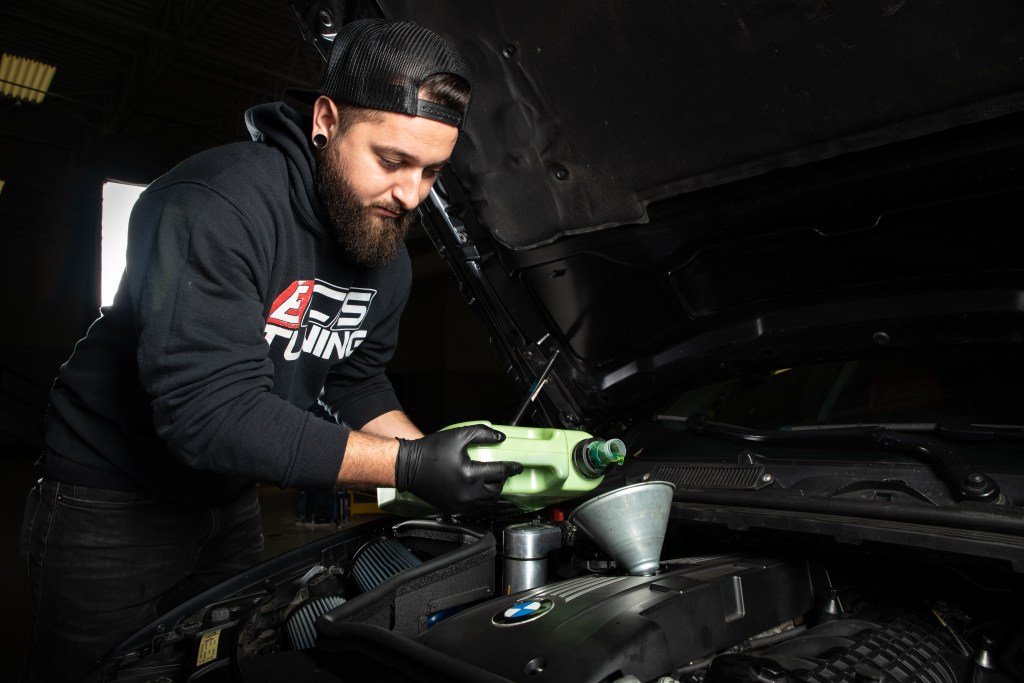
Injector Failure
The direct-injection system on the N54 injects fuel directly into the combustion chamber rather than into the intake manifold ports. This offers benefits for fuel delivery, but the factory injectors are somewhat failure-prone, especially as they age. It’s a matter of when they fail, not if they’ll fail. Symptoms of injector failure include hard starting, random misfires at idle, and likely will not throw a Check Engine Light. Upgrading to the newer Index 12 BMW injectors is a common fix and considered an improvement. However, unlike port injection, direct injectors do require a bit more finesse to remove and install properly. Fortunately, we have the specific tools that make injector and injector o-ring replacement easy. Our Schwaben Injector O-Ring Removal and Install tool and Injector Tool are just what you need to tackle this service.
Assembled by ECS N54 Fuel Injector Replacement Set

N54 Opinions
Everything on this list effectively boils down to one simple fact: these engines are now a decade or more in age and likely have seen tens, if not hundreds, of thousands of miles on the road with owners who may or may not have cared for them the way they need. Regular maintenance, preventative inspections and upgrades, and the understanding that old parts wear out will help you stay ahead of any problems that may arise with your N54. Our verdict is that the N54 is not inherently unreliable, nor is it difficult to maintain, it just requires a bit more attention when compared to non-performance engines. If you keep up with maintenance and know what your biggest problem areas are, there is no reason to think your N54 will be unreliable, even making tons of power. To keep it happy and healthy, you can find all the BMW parts you need to maintain it here at ECS.
Audi 2.7T
For the 2.7T, owners are concerned with similarly large system failures and difficult maintenance. Turbo failure, timing belt failure, leaks, and exhaust gas temperature sensor failure, among other common issues with aging engines. Again, we suggest regular service to keep your 2.7T happy. Disclaimer; it may sound like we’re somewhat proving the unreliability of the 2.7T. This isn’t the case. Yes, you may need to do a bit of work and future proofing if you buy a 2.7T-powered Audi, but that’s due to the age and condition of the car. Remember, these are nearly twenty years old and likely hundreds of thousands of miles have deteriorated several wearable parts. That’s just what happens, parts wear out. It’s a bit unfair to say ‘this engine is unreliable’ when it really just needs to be overhauled to be happy for another 200,000 miles with some fresh new Audi S4 parts to replace the tired examples in this aging platform.
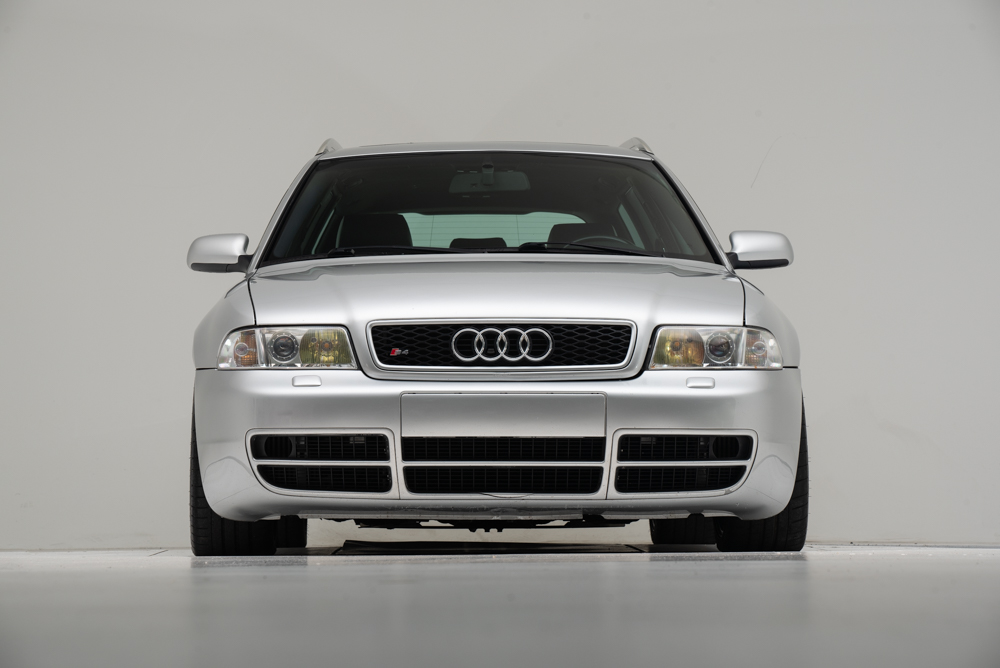
Turbo Failure
While it’s much more common with upgraded software tunes that are popular for the 2.7T, the stock turbos can fail even on completely stock engines. Whether due to age or driving style, the result is the same; a difficult turbo replacement due to their location. If you’re looking for a B5 S4 or other 2.7T for your next project, it’s in your best interest to ask about the turbos and whether they’ve been replaced in the past. If not, before you begin upgrading, you should consider either a factory pair of replacement turbos or opt for an upgraded set capable of handling more power. Unless you have proof that they’re new and show no signs of wear and tear, you should prepare to swap those turbos out immediately. This service may be a headache, but it will prevent any issues in the near to even distant future while driving your 2.7T-powered Audi.
Timing Belt
Since it’s easier to swap those turbos while the engine is out, it’s also a good idea to include a timing belt service with that job. The timing belt on the 2.7T is on the front of the engine but is virtually inaccessible without removing the front core support and bumper.* While timing belts are less complicated than their timing chain cousins, they do have a shorter operational lifespan and require more frequent maintenance. Like the turbos, unless you have proof that your timing belt has been serviced recently, you should anticipate performing this service immediately. By opting for preventative service rather than reactionary maintenance, you’ll ensure your 2.7T ownership is as enjoyable as possible with the added peace of mind that everything is working properly.
*Corrected – thank you for the MANY comments correcting the TB location.
ECS Tuning Build Your Own 2.7T Timing Service Kit
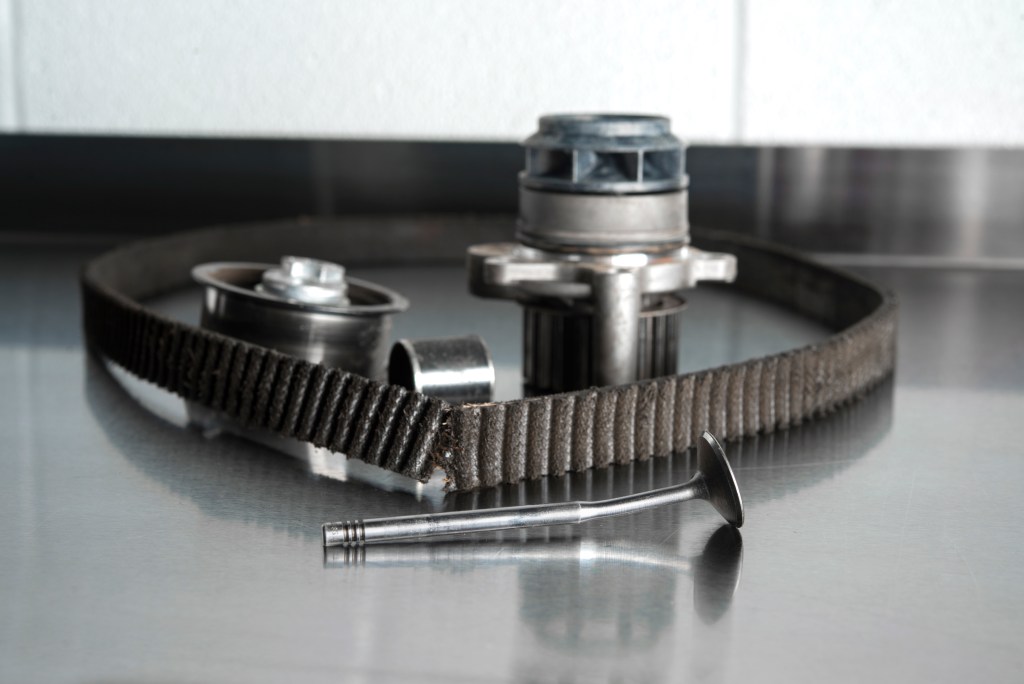
Leaks (Oil / Coolant)
While no more common than any aging engine, the 2.7T is at it’s youngest over a decade old. As a performance engine, it’s likely not had an easy life, either. Gaskets and seals expand, shrink, crack, deteriorate, and eventually leak at some point. With the engine out for your timing service and turbo replacement, it’s a great time to inspect the engine from top to bottom for any hidden oil leaks. The 2.7T is packed into that engine bay so tightly that you may never see the leak or at least determine it’s source if you have a few drips on the ground. Tackling your cooling system service with the engine out and replacing any gaskets like the oil pan gasket, valve cover gaskets, rear main seal, and anything else that might leak is a great way to prevent taking the engine out in the near future to hunt down that leak. Do the job once, do it right, and you’ll never have to worry about it again.
Assembled by ECS Audi Valve Cover Gasket Complete Kit
Assembled by ECS Audi 2.7T Rear Crank Seal Flange & Gasket Kit
Assembled by Audi BMW Oil Service Kits
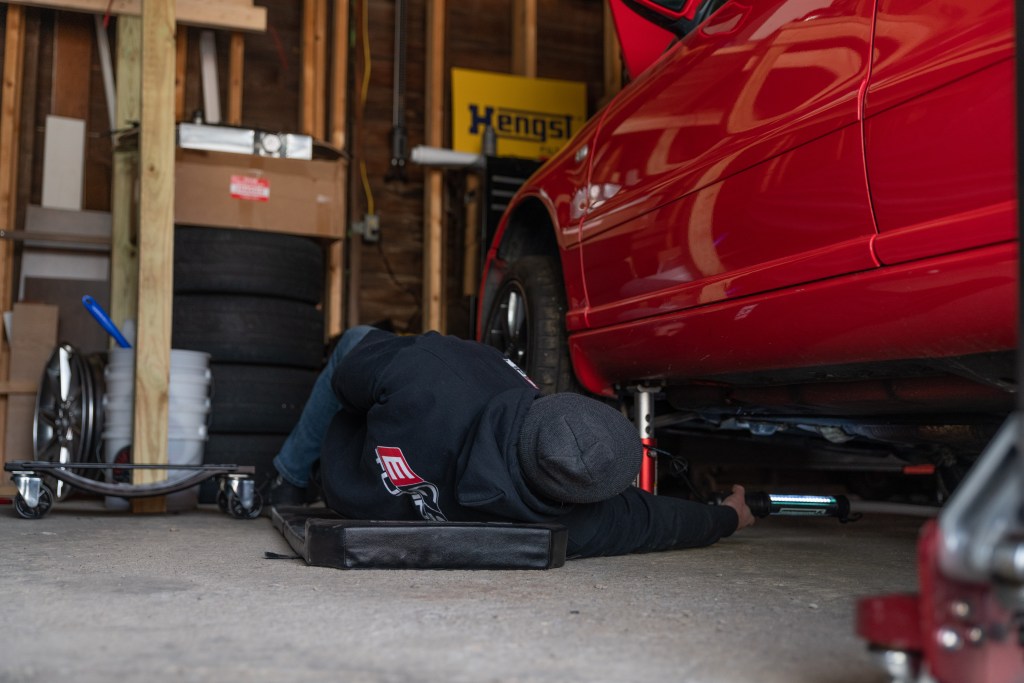
Exhaust Gas Temperature Sensors
Finally, one of the other common failures are EGT sensors for 2.7Ts. They’re a pain to get to and rather expensive, but in most owners’ experiences, they aren’t necessary. The EGT sensors monitor temperature in the exhaust to help regulate air/fuel mixtures, but they aren’t the only place your ECU takes data to determine the mixture. Many upgraded software tunes can and do code these sensors out, which will eliminate their need to be replaced.
However, if you do intend to replace them, it’s important to replace them in pairs. Only replacing one sensor can result in the system not understanding differences in signals from the new and old sensor, which will end up with the same fault codes and limp mode.
2.7T Opinions
The Audi 2.7T is a well-loved engine for its power capabilities, but it’s also somewhat feared for its difficulty to service. While it may not have as many Achilles’ Heels as the N54, working on the 2.7T is somewhat more of a challenge, but that doesn’t mean you should be afraid of it. With all these services performed at once with the engine out, you’re able to undo almost two decades of abuse and ready for two more decades without problems. Since these engines are old, most of this list is to be expected. With the right approach and an understanding that all this work is necessary, the 2.7T can be seen as reliable. Just know that you’ll need to do it right the first time to have that experience and we’ll be here with the right Audi parts to help.
Wrapping Up
What we’ve learned through living and loving these cars, and others that carry similar stigma, is that no matter what car it is, maintenance is key to keeping it running. The fact is, almost every engine and car model will vary wildly in their dependability when purchased second-hand. It all depends on how well they were maintained and what you do to continue that upkeep. With proper service and care, even the engines with the worst reputations can be some of the most rewarding, especially when it comes to performance. To keep up with your maintenance, that’s why we’ve created entire service kits. Whether it’s just your daily you’re keeping on the road, your race car teardown at the end of a tough season, or your project build, maintenance is critical to success and we have you covered with everything you need to wipe the negative stigma about N54s, 2.7Ts, and other ‘unreliable’ engines from the community.







Good article but the timing belt on the 2.7t is on the front side of the engine. The 4.2 v8 in the B6 and B7 S4 had chains on the transmission side.
If you can’t tell, I’m a BMW guy! Even had a B5 S4 owner check my work and advise me on the 2.7T stuff… Thanks! Edited.
Have a 195k mile N54. Doesn’t use a drop of oil and runs as it did new. Have never had anything happen beyond the common issues and often times those issues give you decent warning.
The key, preventative maintenance and popping the hood every now and then just to look for the little clues (ie oil around the serp belt or near the filter mount, checking coolant, etc.)
I’ll be honest, have been in the VW/Audi scene for a LONG time and feel that the longitudinal layout and think the n54 has been pretty simple to work in considering.
Too often, you see guys going FBO without even considering the preventative. That, is just asking for issue!
Decent read here!
agreed! Everyone that says any engine is ‘unreliable’ either hasn’t maintained it or bought it from someone who didnt.
I have owned both and agree that neither is inherently unreliable. BUT, I would like to see ECS link videos of these installation jobs that do NOT employ a lift, as 99% of DIY mechanics do not. Both the N54 water pump and the 2.7T timing belt require a ton of work to get access to the component. They are way beyond most driveway mechanics and I would say even pros without a lift. FYI. The better strategy is to buy a car as the second owner form a car-person who really took care of it and then to overdue fluid maintenance and not go hog-wild on the boost in your tune. Then sell it at around 100k before it becomes a money pit. So that means moving on to the Audi 3.0T and N55. Can’t afford such? Think GTI or R.
Thanks for sharing your thoughts and information about the two engines. Particularly the 2.7 since that is what I own. I’m currently pushing +251k miles and have two issues, that may be one. That is an electrical (parasitic) draw and a surge when pressing hard on the throttle. ***They both might be related.
With that said, I’m keeping my ride! Love her and my son is begging me to give her to him.
For the 2.7T I would really also include the Chain tensioners, Most previous owners never change them on the 1.8T, 2.8 & 2.7T. Ive dealt with a few 2.8’s and 1.8T’s where they had almost 200k and these were never changed and about to give out taking the top end with em.. And they by far were the hardest most time consuming components to change out
The rest of the issues mentioned with these engines I would consider fairly typical and really not bad at all for the age, You guys covered them well.
Timing belt was easy on the 2.8, I could have the front end off in 5mins and not have to touch coolant or AC lines and the job itself with the right tools is fairly easy. Slow, But not bad. Not sure about the 2.7T as its got a ton more hardware in the engine bay, but still for what you can get out of the 2.7T I really don’t think it should scare anyone away!
Hey Hunter – you’re probably right, I should mention the tensioners specifically. We have timing service kits that are linked that include them, but I’ll edit! And yes, the issues are mostly age-related. We think that tends to skew peoples’ perspectives when they experience failures. To them, it’s unreliable. In reality, it just needed some good ol’ service! Thanks for reading!